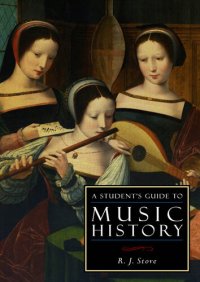
Ebook: A Student's Guide to Music History
Author: R.J. Stove
- Tags: History, Music, Nonfiction, MUS006000, MUS020000, MUS050000
- Series: Isi Guides to the Major Disciplines
- Year: 2014
- Publisher: Intercollegiate Studies Institute
- Language: English
- epub
"Delightfully sophisticated . . . the only music history that can be savored, muscatel in hand, in the green shade of a beach umbrella" (John Simon, The Hudson Review).
R. J. Stove's A Student's Guide to Music History is a concise account, written for the intelligent lay reader, of classical music's development from the early Middle Ages onwards. Beginning with a discussion of Hildegard von Bingen, a twelfth-century German nun and composer, and the origins of plainchant, Stove's narrative recounts the rise (and ever-increasing complexity) of harmony during the medieval world, the differences between secular and sacred music, the glories of the contrapuntal style, and the origins of opera. Stove then relates the achievements of the high baroque period, the very different idioms that prevailed during the late eighteenth century, and the emergence of Romanticism, with its emphasis upon the artist-hero. With the late nineteenth century came a growing emphasis on musical patriotism, writes Stove, especially in Spain, Hungary, Russia, Bohemia, Norway, Denmark, Finland, and the United States. A final section discusses the trends that have characterized music since 1945.
Stove's guide also singles out eminent composers for special coverage, including Palestrina, Monteverdi, Handel, Bach, Haydn, Mozart, Beethoven, Schubert, Wagner, Verdi, Brahms, Debussy, Richard Strauss, Sibelius, and Messiaen. As a brief orientation to the history and contours of classical music, A Student's Guide to Music History is an unparalleled resource.
R. J. Stove's A Student's Guide to Music History is a concise account, written for the intelligent lay reader, of classical music's development from the early Middle Ages onwards. Beginning with a discussion of Hildegard von Bingen, a twelfth-century German nun and composer, and the origins of plainchant, Stove's narrative recounts the rise (and ever-increasing complexity) of harmony during the medieval world, the differences between secular and sacred music, the glories of the contrapuntal style, and the origins of opera. Stove then relates the achievements of the high baroque period, the very different idioms that prevailed during the late eighteenth century, and the emergence of Romanticism, with its emphasis upon the artist-hero. With the late nineteenth century came a growing emphasis on musical patriotism, writes Stove, especially in Spain, Hungary, Russia, Bohemia, Norway, Denmark, Finland, and the United States. A final section discusses the trends that have characterized music since 1945.
Stove's guide also singles out eminent composers for special coverage, including Palestrina, Monteverdi, Handel, Bach, Haydn, Mozart, Beethoven, Schubert, Wagner, Verdi, Brahms, Debussy, Richard Strauss, Sibelius, and Messiaen. As a brief orientation to the history and contours of classical music, A Student's Guide to Music History is an unparalleled resource.
Download the book A Student's Guide to Music History for free or read online
Continue reading on any device:

Last viewed books
Related books
{related-news}
Comments (0)